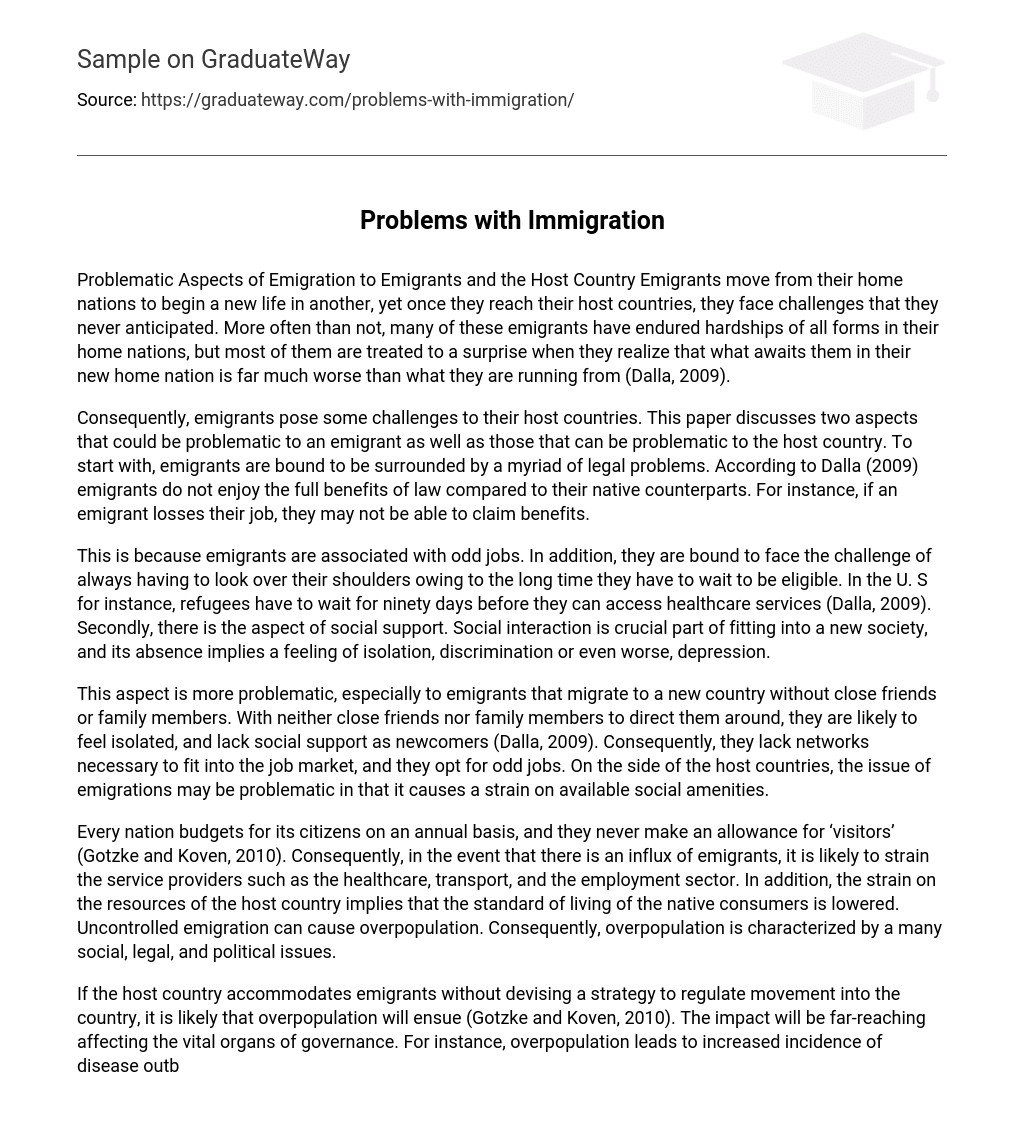Problematic Aspects of Emigration to Emigrants and the Host Country Emigrants move from their home nations to begin a new life in another, yet once they reach their host countries, they face challenges that they never anticipated. More often than not, many of these emigrants have endured hardships of all forms in their home nations, but most of them are treated to a surprise when they realize that what awaits them in their new home nation is far much worse than what they are running from (Dalla, 2009).
Consequently, emigrants pose some challenges to their host countries. This paper discusses two aspects that could be problematic to an emigrant as well as those that can be problematic to the host country. To start with, emigrants are bound to be surrounded by a myriad of legal problems. According to Dalla (2009) emigrants do not enjoy the full benefits of law compared to their native counterparts. For instance, if an emigrant losses their job, they may not be able to claim benefits.
This is because emigrants are associated with odd jobs. In addition, they are bound to face the challenge of always having to look over their shoulders owing to the long time they have to wait to be eligible. In the U. S for instance, refugees have to wait for ninety days before they can access healthcare services (Dalla, 2009). Secondly, there is the aspect of social support. Social interaction is crucial part of fitting into a new society, and its absence implies a feeling of isolation, discrimination or even worse, depression.
This aspect is more problematic, especially to emigrants that migrate to a new country without close friends or family members. With neither close friends nor family members to direct them around, they are likely to feel isolated, and lack social support as newcomers (Dalla, 2009). Consequently, they lack networks necessary to fit into the job market, and they opt for odd jobs. On the side of the host countries, the issue of emigrations may be problematic in that it causes a strain on available social amenities.
Every nation budgets for its citizens on an annual basis, and they never make an allowance for ‘visitors’ (Gotzke and Koven, 2010). Consequently, in the event that there is an influx of emigrants, it is likely to strain the service providers such as the healthcare, transport, and the employment sector. In addition, the strain on the resources of the host country implies that the standard of living of the native consumers is lowered. Uncontrolled emigration can cause overpopulation. Consequently, overpopulation is characterized by a many social, legal, and political issues.
If the host country accommodates emigrants without devising a strategy to regulate movement into the country, it is likely that overpopulation will ensue (Gotzke and Koven, 2010). The impact will be far-reaching affecting the vital organs of governance. For instance, overpopulation leads to increased incidence of disease outbreaks. In addition, the natives may feel threatened by the ever-increasing number of foreigners, which may lead to civil unrest. In view of the aforementioned aspects, it is evident that emigration poses significant problems both to the emigrants and the host country.
Whilst emigrants are likely to be surrounded by legal problems in addition to the lack social support, they are likely to strain the available resources in the host country. In addition, the host country may have to confront the problem of overpopulation as a result of uncontrolled influx of emigrants.
References
Dalla, L. R. , (2009). Strengths and Challenges of New Immigrant Families: Implications for Research, Education, Policy, and Service. New York, NY: Lexington Books. Koven, S. G, & Gotzke, F. P. , (2010). American Immigration Policy: Confronting the Nation’s Challenges. New York, NY: Springer.





